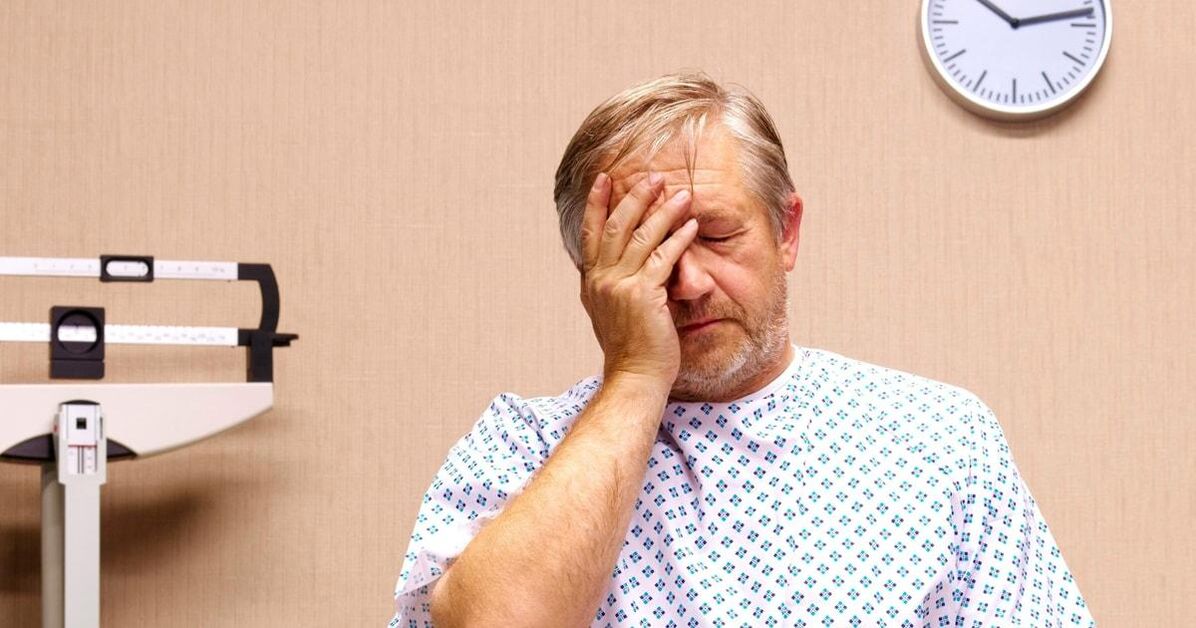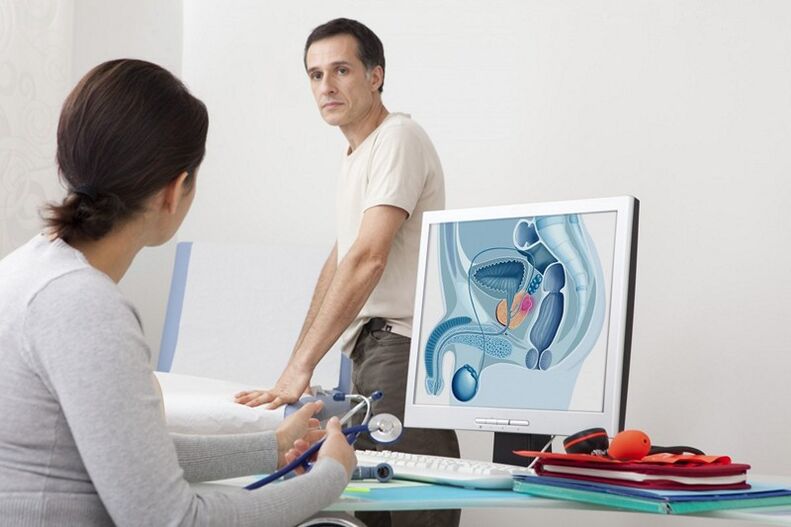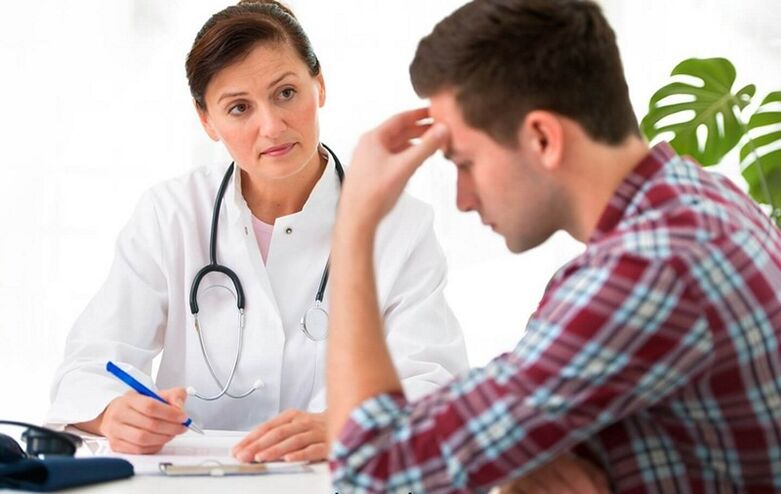One of the most common diseases in men is prostatitis. In no case should his treatment be delayed, because the prostate performs important functions, and its inflammation is caused by a dangerous infection. How do the symptoms of prostatitis manifest in men?

In the following, we will tell you by what signs this disease can be determined and consider the methods of its treatment.
Signs of illness
There are usually three types of painful symptoms:
- Disorders of the genitourinary system. It is followed by a cut in the groin area during urination and a constant urge to use the toilet. Bleeding is possible. Urination occurs in small portions;
- Sexual dysfunction. It is accompanied by pain in the canal, rectum during ejaculation. There is also a decrease in potency, frequent emissions, loss of orgasm. There is also a drop in erection or its complete absence;
- Nervous system disorders. They are accompanied by apathy, aggression, mental and emotional stress.
Types of diseases
Chronic prostatitis
In chronic prostatitis, symptoms are expressed only at the time of exacerbation. There are no symptoms in remission. During the onset of the disease, fever may rise, joints ache, increased sweating, the patient suffers from insomnia, no appetite, apathy, fever, chills. Headaches are not excluded.
This type of disease is caused by fungi or viruses that have entered the organs of the lower pelvis. Representatives of such fauna are E. coli, staphylococcus, chlamydia. It can be noticed that Helicobacter is not included in the list of causes - it is natural, because it does not cause prostatitis.
Of course, each of us has microbes that cause disease. However, the human body is designed in such a way that the immune system prevents them from reproducing. Therefore, if the protective function is impaired, then a person easily becomes a hostage of inflammatory processes. At the appearance of the first symptoms it is necessary to visit a doctor. He will perform a rectal examination, take the necessary tests and prescribe a course of treatment.
Bacterial prostatitis
This type of disease is caused by pathogenic bacteria. The symptoms are the same as in chronic prostatitis. It is bacterial prostatitis that most often turns into a chronic form. Such inflammation needs to be treated in a comprehensive way. Only the general effect of medications, prostate massage and other physiotherapy procedures will prevent the disease from progressing to a chronic phase.
Competent urologists prescribe antibiotics. They destroy all pathogenic microorganisms. It is very important that you see a doctor on time. You cannot stop taking the medication after the condition improves, because you can worsen the result and suffer from this disease for many years.
Sclerotic prostatitis
Sclerotic prostatitis is manifested in people suffering from persistent constipation, as well as when taking certain medications. The disease is expressed by the reduction of the prostate and the thickening of its tissues - this type of disease is incurable.
Prostatotic prostatitis
The causes of the prostatopathic type of disease have not yet been elucidated. It is followed by aching pain in the groin. Treatment is given to patients individually.
Abacterial prostatitis
Abacterial prostatitis develops due to stagnation of semen, circulatory disorders. However, the most common cause is zinc deficiency. It is an important component in the male reproductive system. Zinc is responsible for the proper production of hormones, potency and reproductive function of the body.
Such a disease is accompanied by a feeling of withdrawal in the groin, lower abdomen and perineum. Sometimes painful sensations occur in the back and backbone. This condition can last for several months. During treatment, anti-inflammatory and hormonal drugs are prescribed, as well as herbal remedies.
Asymptomatic prostatitis
The peculiarity of asymptomatic prostatitis is that the disease develops without any symptoms. Unfortunately, the disease manifests itself in the late stages. At that time the prostate is greatly enlarged, urination is disturbed. To determine the disease, urine is analyzed for bacteria and white blood cells. Such prostatitis often becomes chronic.
If you do not have an erection in the morning and there are frequent urges in the dark, then this indicates the beginning of the disease.
Timely treatment should not be neglected, as inflammation of the prostate can become chronic. Bladder damage can also occur, which will make it difficult for you to go to the toilet. Indifference to one's health threatens infertility, abscess, cystitis and sepsis. Some of the consequences can only be cured surgically.
Do not try to treat without the help of a specialist. Consult your healthcare provider before using any method.
Is prostatitis contagious and how to treat it?
Sex life with prostatitis is not forbidden. After all, its absence is what causes this disease. The presented disease is relevant only for the stronger sex. However, semen contains elements that cause inflammation. Therefore, if such sperm reaches the female genital organs, serious problems with a woman's reproductive function can occur. It is very important to protect yourself and lead a healthy lifestyle.
Prostate massage
This method of treating prostatitis is prescribed as an adjunct therapy. In addition, massage is an excellent disease prevention. With its help, the urologist can understand the stage of the tumor. Prostate massage can help prevent sperm buildup, which is a common cause of inflammation.
This procedure relaxes the gland, improves blood circulation and oxygenates the organ. It also relieves unpleasant symptoms, uncomfortable feelings, prevents the development of cancer and normalizes urination.
Urological treatment
When you go to the clinic, you will most likely be prescribed medication or surgery. It all depends on the stage of the disease.

Take the drug only on the advice of experts, as some of the drugs have a number of contraindications.
If the disease does not respond to drug treatment, the patient is referred for surgery. The most common method is transurethral resection. During this procedure, the tumor is removed through the urethra. This type of surgery is most often prescribed in the middle phase of disease development, in the absence of an infectious lesion. This type of intervention does not preserve sexual function.
The best solution is a minimally invasive method. This method punctures the skin, and then removes the damaged tissue in the bladder. However, among the advantages is the low probability of injury and penetration of infections, the absence of complications. Such surgery is available at any stage of the disease.
Recommendations
Special attention should be paid to diet. Try to eliminate fatty, heavy, spicy and fried foods from your diet forever. Do not use too many flour products, pastries and pickles. Customize your menu. Eat only healthy and natural foods, including vegetables and fruits, nuts, lean meats, dried fruits, freshly squeezed juices.
Avoid alcoholic beverages, coffee, eggs, fatty meats and mushrooms. Forget greasy soups, hot spices, fizzy drinks.
Take a relaxing bath with herbal teas such as chamomile. Perfectly copes with inflammation, removes toxins, helps the kidneys and liver, restores metabolism. It is worth noting the need for physical activity. Light exercise, swimming in the pool, morning walks and following a special diet will help prevent prostate disease.

If you have experienced prostatitis once, visit a urologist once a year. This is necessary in order to monitor your condition and prevent the recurrence of the disease.





























